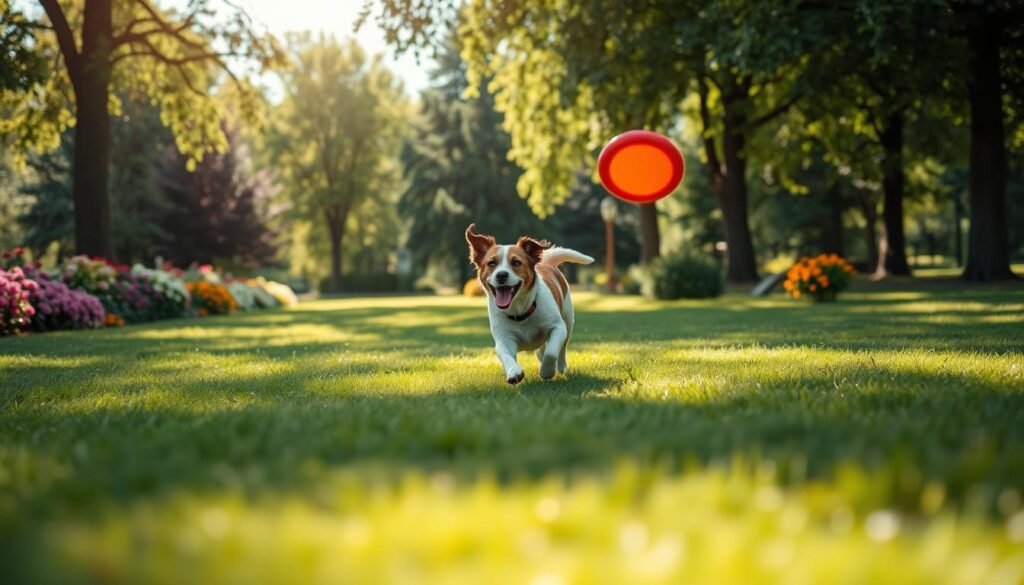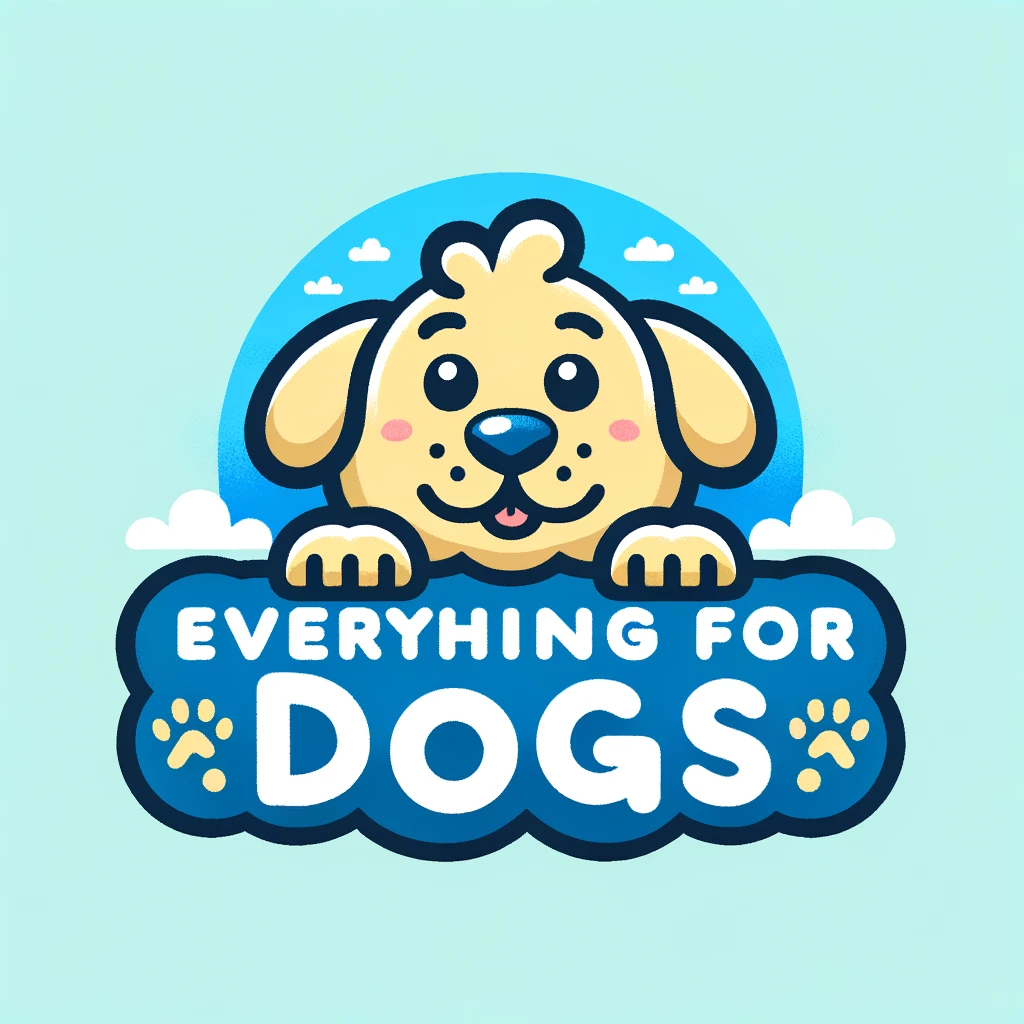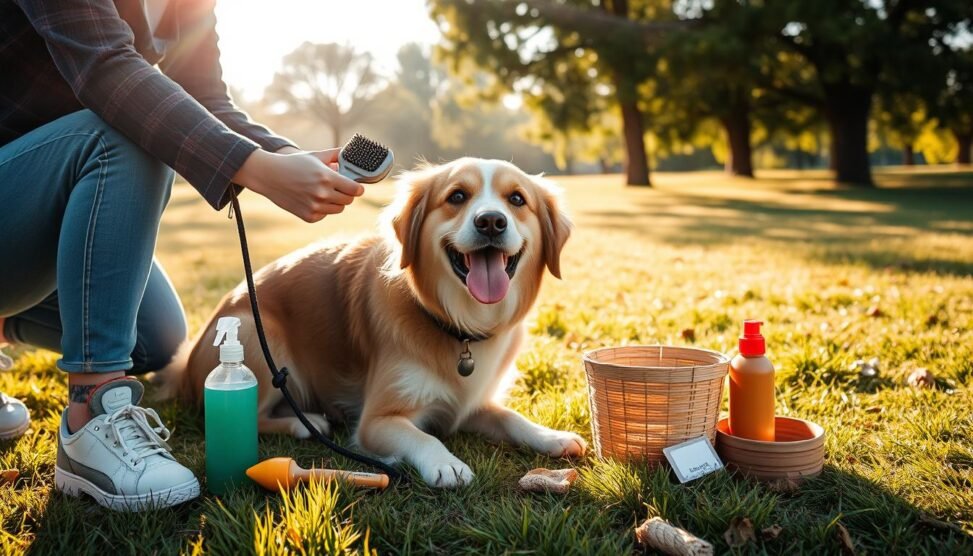Welcoming a new canine companion into your home is a thrilling and rewarding experience. As a first-time dog parent, it’s crucial to have a solid understanding of the essential aspects of dog care. This ensures your furry friend’s health, happiness, and well-being. This comprehensive guide will walk you through the fundamentals of dog care. It covers feeding, exercise, grooming, and veterinary care.
When considering adding a dog to your family, it’s important to make adoption your first choice. The ASPCA offers a wide range of adoptable dogs through their online directory. Their Find a Shelter page can connect you with local shelters and rescues. By choosing to adopt, you not only provide a loving home for a deserving pup but also support the important work of animal welfare organizations1.
Key Takeaways
- Adopt your new dog from a reputable shelter or rescue organization
- Understand the appropriate feeding schedule and dietary needs for puppies and adult dogs
- Provide your dog with regular exercise and mental stimulation to keep them healthy and happy
- Establish a consistent grooming routine to maintain your dog’s hygiene and appearance
- Stay on top of your dog’s veterinary care, including vaccinations, preventive treatments, and regular check-ups
Essential First Steps for New Dog Parents
Bringing a new furry friend home is both thrilling and demanding. As a new dog parent, your main duties include getting the right dog supplies, making your home safe, and setting up a daily routine2.
Choosing the Right Dog Supplies
Starting with the basics is key to caring for your new pup. You’ll need high-quality dog food, bowls, a comfy bed, tough toys, grooming tools, and a collar with an ID tag3. These essentials are vital for your dog’s health and create a nurturing space from the beginning4.
Creating a Safe Home Environment
It’s vital to puppy-proof your home to keep your dog safe. Secure any dangers like chemicals, electrical cords, and small items that could be swallowed. Create a cozy, safe area where your dog can relax and feel secure4. This ensures a safe, stress-free space for your dog2.
Setting Up a Daily Routine
Creating a daily routine is crucial for your dog’s happiness and training. Include regular feeding times, walks, play, and rest. Use treats like chicken or cheese for positive reinforcement training to teach commands like “Sit,” “Come,” and “Stay.”3 Short, frequent training sessions keep your pup engaged3.
By focusing on these first steps, new dog parents can ensure their pets thrive. Remember, patience and consistency are essential in the journey of dog ownership4.
Basic Dog Care Tips For Beginners
As a new dog parent, it’s crucial to lay a solid foundation of basic dog care. This includes proper dog feeding, exercise, essential grooming, and first aid. These tips will ensure you provide the best care for your furry companion.
Feeding Your Dog
Puppies have specific nutritional needs that evolve as they grow. Puppies 8 to 12 weeks old need four meals a day5. Those three to six months old require three meals a day5. By six months to one year, two meals a day is usually enough5.
Premium-quality dry food is key for adult dogs’ balanced diets5. They can also enjoy small amounts of cottage cheese, cooked eggs, fruits, and vegetables. However, these should not exceed ten percent of their daily intake5.
Exercise and Activity
Regular dog exercise is vital for your pet’s physical and mental health. The exercise needed varies by breed, age, and health. Consult your vet to set an appropriate routine. A well-exercised dog tends to be more well-behaved.
Grooming and Hygiene
Proper dog grooming keeps your pet clean, comfortable, and healthy. Most dogs only need a few baths a year5. Regular brushing and nail trimming are key grooming tasks. Don’t forget to maintain dental health through brushing and vet cleanings.
Pet First Aid and Safety
Having a pet first aid kit and knowing basic first aid can save lives. It’s also vital to follow all pet first aid and licensing laws in your area5.
Understanding these essential dog care tips will help you give your furry friend a happy, healthy life. Remember, preparation and proactive care are key to your dog’s well-being.

“Caring for a puppy can sometimes feel like a full-time job, especially if the puppy is very young.”6
Proper Nutrition and Feeding Guidelines
Ensuring proper nutrition is crucial for your dog’s overall health and well-being. Dogs can meet their nutritional needs by eating a combination of plant and animal foods7. Their dietary needs have evolved to be omnivorous, meaning they can thrive on a balanced vegetarian diet as long as essential components like proteins and fats are of high quality and digestibility7.
Puppy Feeding Schedule
Puppies have unique nutritional needs that differ from adult dogs. Puppies under six months should be fed three or four meals a day8. After six months, puppies can transition to two to three meals a day8. This frequent feeding schedule ensures they receive the necessary nutrients for growth and development.
Adult Dog Dietary Needs
A well-balanced diet for adult dogs should include minerals, vitamins, essential amino acids, and essential fatty acids that vary depending on the dog’s life stage7. Dogs can digest carbohydrates and use them for energy, alongside proteins and fats7. Commercial pet foods are formulated based on nutritional guidelines set by the Association of American Feed Control Officials (AAFCO), which establish minimum dietary requirements for nutrients7. The best approach to selecting dog food is to choose high-quality options with real, recognizable, whole-food ingredients7.
Water and Hydration Requirements
Ensuring your dog has access to clean, fresh water at all times is essential for their health. Water makes up more than half of an adult dog’s body weight, and losing only 10% of their body water can endanger their life9. Treats and table scraps should not exceed 10% of a dog’s daily caloric intake to prevent issues such as obesity, diabetes, and heart disease9. Most large-breed dogs should be fed at least twice a day to avoid overeating and bloating9.
| Nutrient | Importance for Dogs |
|---|---|
| Essential Fatty Acids | Include Linoleic acid, Omega-6, and Omega-3, which are vital for dogs’ health9. |
| Amino Acids | Dogs need 13 out of 23 amino acids from food to support body tissue formation9. |
| Vitamins and Minerals | Balanced dog food should contain essential vitamins and minerals like Vitamin A, D, E, K, B-complex vitamins, calcium, and phosphorus for proper health9. Over-supplementation of vitamins and minerals can be harmful to dogs9. |
Exercise and Mental Stimulation Requirements
Keeping your dog physically and mentally active is key to their health and happiness. Regular exercise not only burns calories but also keeps their mind sharp. This prevents boredom and destructive behaviors10.
The exercise needs of your dog depend on their breed, age, and health11. Puppies have boundless energy and need frequent, intense physical activity. Senior dogs, on the other hand, benefit from gentler exercises to maintain their well-being11.
- High-energy dog breeds, such as herding or working dogs, generally require more intense exercise compared to lower-energy breeds11.
- Engaging in a variety of activities, like hiking, swimming, and obedience training, can provide both physical and mental stimulation for your canine companion11.
- When outdoor activities are not feasible, indoor exercises like stairs, hide-and-seek, and treadmill workouts can be excellent alternatives11.
To keep your dog mentally stimulated, incorporate puzzle toys, teach new tricks, and vary their daily routine10. These activities can tire out your dog more effectively than physical exercise alone10.
| Exercise Type | Benefits |
|---|---|
| Fetch | Provides physical activity and mental stimulation through problem-solving and retrieval. |
| Agility Training | Challenges dogs both physically and mentally, improving their coordination and focus. |
| Nose Work | Engages a dog’s natural scenting abilities, reducing stress and releasing dopamine. |
A well-exercised and mentally stimulated dog is a happy, well-adjusted companion. Tailoring your dog’s activity levels and engaging their mind fosters a stronger bond. It also leads to a healthier, more fulfilling life together1011.

As Dr. Karen Becker, a renowned veterinarian, states: “A tired dog is a good dog.”
By providing ample opportunities for physical and mental exercise, you can help your canine companion stay happy, healthy, and well-adjusted.
Grooming and Hygiene Maintenance
Keeping your dog clean and well-groomed is vital for their health and happiness. Regular brushing, baths, nail trims, and dental care are crucial. These practices are fundamental to being a responsible dog owner12.
Brushing and Bathing Basics
Brushing your dog’s coat regularly helps remove loose hair and spreads skin oils. It also allows you to spot any skin problems or parasites early. The right brush depends on your dog’s breed, with long-haired dogs needing pin brushes and short-haired ones bristle brushes13. Bathing should be done a few times a year, using a dog-specific shampoo to keep their coat and skin healthy12.
Nail Care and Dental Health
Trimming your dog’s nails monthly is essential to avoid discomfort and gait problems. It’s vital for their foot health13. Brushing their teeth daily with dog-safe toothpaste is also crucial. This keeps their teeth clean and prevents dental issues that could lead to serious health problems12.
Ear Cleaning and Maintenance
Cleaning your dog’s ears at least once a month is necessary to prevent infections. Use a vet-approved ear cleaner for this purpose1213. Regular grooming visits also ensure your dog’s hygiene and appearance stay top-notch13.
Every dog is different, so it’s important to consult with your vet for a grooming plan tailored to your dog’s breed and needs. Sticking to a grooming schedule keeps your dog happy, healthy, and looking great13.
Health Care and Veterinary Needs
Keeping your dog healthy is paramount, and regular vet visits are crucial. Adult dogs should see the vet annually, while seniors need bi-annual check-ups to stay well14. It’s vital to keep vaccinations up to date, considering your dog’s age, lifestyle, and location14. Microchipping is also a good idea, as vet clinics can help find lost dogs14.
Knowing about common toxins and having the ASPCA Animal Poison Control Center number (888-426-4435) ready can help quickly address health issues14. Spaying or neutering by six months of age is key for your dog’s health and to prevent unwanted litters15. Always watch for changes in your dog’s behavior or health and consult your vet if needed.
Your commitment to your dog’s health is a lifelong journey. Working closely with your vet ensures your pet enjoys a long, happy, and healthy life16. By focusing on dog health, veterinary care, pet vaccinations, and dog microchipping, you offer your pet the best care possible.
FAQ
What are the essential first steps for new dog parents?
For new dog parents, securing essential supplies and creating a safe home environment are crucial. This includes getting the right food, bedding, toys, and grooming tools. It’s also important to puppy-proof your home and establish a consistent daily routine for feeding, walking, and playtime.
What basic dog care tips should I know as a beginner?
Basic dog care involves proper feeding, regular exercise, grooming, and health maintenance. Feed puppies and adult dogs based on their age and size. Ensure they get enough exercise, considering their breed and energy level. Create a regular grooming routine to keep your dog clean and healthy.
How do I ensure my dog is getting proper nutrition?
Ensuring your dog’s proper nutrition is vital for their health. Puppies need more frequent meals, while adult dogs typically require one or two meals a day. Use premium-quality dry food as the main diet, with occasional fruits and vegetables. Always provide clean, fresh water. Avoid overfeeding to prevent obesity and related health issues.
What are the exercise and mental stimulation requirements for dogs?
Regular exercise is essential for your dog’s physical and mental health. It helps burn calories, stimulate their mind, and prevent boredom-related destructive behaviors. Exercise needs vary based on breed, age, and health status. Include daily walks, playtime, and mental stimulation activities like puzzle toys and trick training.
What are the essential grooming and hygiene tasks for dogs?
Regular grooming is crucial for your dog’s health and appearance. Brush your dog frequently to reduce shedding, bathe them as needed, trim their nails regularly, and brush their teeth daily to maintain dental health. Clean their ears regularly with a veterinarian-approved cleaner to prevent infections.
What are the key health care and veterinary needs for dogs?
Regular veterinary care is essential for maintaining your dog’s health. Schedule annual check-ups for adult dogs and bi-annual visits for senior dogs. Keep up with vaccinations, consider microchipping your dog, and be aware of common household toxins. Monitor your dog’s health regularly and consult your vet if you notice any changes in behavior or physical condition.



Leave a Reply